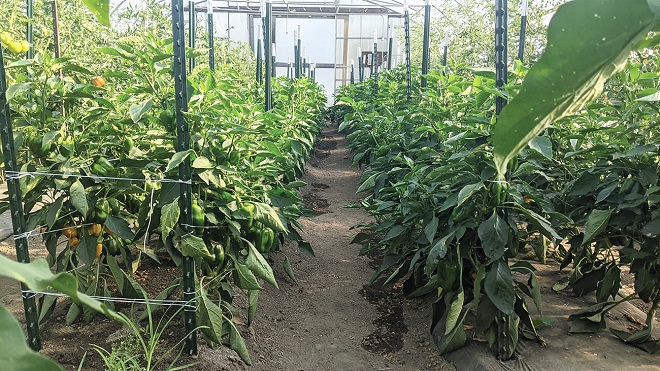

Aug 18, 2023High tunnel boost: Improve production
High tunnels are popular season extension tools for vegetable crops across the U.S. While most northern high tunnels use inflated double-layer plastic cover, application in the Southeast is questionable due to the mild spring climate.
Sanjun Gu, Extension specialist and associate professor of horticulture at Virginia State University (VSU), Petersburg, Virginia, studied how layers of plastic cover and plastic mulch affect organic bell pepper productivity in high tunnels.
The studies were conducted March to August in 2021 and 2022 with organic tomato, bell pepper and eggplant trials at the North Carolina Agricultural and Technical State University (N.C. A&T) University Farm in Greensboro and Cherry Research Farm in Goldsboro.
The research objective was to learn if high tunnels should be single-layer or double layer plastic cover for warm-season vegetables in plant hardiness zone 7 and 8 of North Carolina, Gu said.
The study confirmed high tunnel production of warm-season vegetable crops should use plastic mulch to significantly increase soil temperatures and boost plant growth early in the season.
“Our research clearly demonstrated that single-layer plastic cover should be used for early harvest of tomato, bell pepper and eggplant in an organic setting or organic-managed setting,” Gu said.
Additional research with cool/cold season vegetable species including bok choy, kale, collard greens and Swiss chard did not show significant differences in winter yield, although the double-layer tunnels provide more comfortable working conditions for growers in the cold but didn’t affect cold-tolerant vegetables.
Air needs to be blown constantly between the layers to inflate the cover, so a high tunnel with a double-layer cover brings added material costs from the second plastic cover, a blower motor/jumper hoses and electric power. Not every high tunnel has electric power, however.
Additional labor is also required to install the second cover and motor/hoses. Because of the savings, growers prefer single-layer plastic cover high tunnels, Gu said.
Double-layer high tunnels have advantages over single-layer high tunnels in areas of heavy snow and high winds, and growers must consider their specific location, Gu said.
Trials
The trial was done with four 30-foot- by 96-foot-high tunnels, two with a single-layer cover and two with a double-layer plastic cover. Olympus, a red pepper; and Sweet Sunrise, an orange pepper, were planted in one bare-soil bed and one plastic mulched bed. Researchers applied three replications of each cultivar with eight plants in a replication.
The total and marketable yield were significantly higher in the single layer than in the double-layer
tunnels (31.3 pounds and 24.5 pounds versus 25 pounds and 21 pounds per plant) in 2021. In 2022, Gu saw no significant difference, with 41.7 and 42.1 versus 27.3 and 32.4 pounds per plant. The yields in early months (June and July) were higher in the single layers than in the double layers, though the trend was reversed in later months, likely due to excessive levels of light intensity entering the single levels, Gu said.
Results
Plastic mulch increased yield regardless of tunnel cover, indicating a practice to recommend in high tunnel pepper production.
Visual differences in growth between plants in bare soil and in plastic-mulched beds were observed in April and May. The cultivars’ yields were similar, though Olympus had higher marketable yield than Sunrise, Gu said.
Additionally, a sequential planting of organic peppers was to test the best time to transplant in high tunnels. Gu studied Sweet Sunshine, a yellow pepper cultivar, and Olympus with three transplanting dates 10 days apart.
He discovered growers can hold the transplanting date until mid-April without losing the advantage of early harvest. Transplanting before April did not bring any advantage. In the fall, it is unlikely to harvest colored fruit before first frost in high tunnels, although growers would be able to harvest full-size green peppers, he said.
“We believe that for bell pepper, growers should focus on spring-summer production and they would have a transplanting window from late March to about April 20 without losing early harvest of color fruit,” Gu said.
Fall production of high tunnel bell peppers is not recommended.
Gu’s research also confirmed that plasticulture, the use of plastic mulch and drip irrigation, a common practice in field vegetable production, should also be used in high tunnels. Previously, researchers assumed the tunnels should be used without the research support, he said.
Gu said he believes his studies will advance research in at least two ways.
“An important one is how to take advantage of global warming, as a result of climate change, in the early season and mitigate negative impacts of global warming with additional research on using shade cloth on high tunnels later in the season,” he said.
Another important area will be to examine pigmented and degradable mulch in high tuMarch, Gu was an Extension horticulture specialist at N.C. A&T for a decade. The tunnel research was funded by the USDA’s National Institute of Food and Agriculture, while a Specialty Crop Research Block Grant supported the sequential transplanting study.
nnels for organic and conventional production systems. Degradable mulch is not currently listed for organic production.
Before joining VSU in — Doug Ohlemeier, assistant editor
Top photo: High tunnels are popular season extension tools for
vegetables, including bell peppers. Photos courtesy of Virginia State University.














